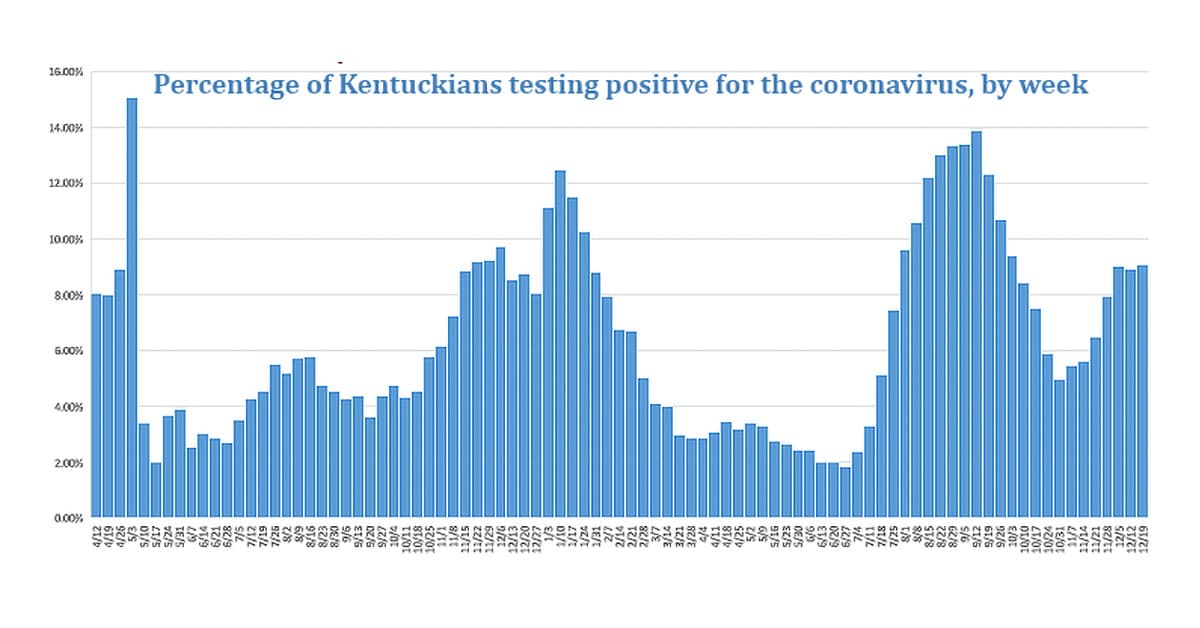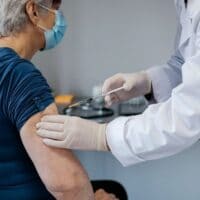Cases of the coronavirus and the share of Kentuckians testing positive for the virus remain on high plateaus, but Gov. Andy Beshear warns that these numbers will go up because of the highly contagious omicron variant of the virus, which is now the predominant strain in the United States.
“Case numbers will go up,” Beshear said at a Monday news conference. “We’ll be watching hospitalizations real closely, that will end up being our major metric that we follow during omicron. But given that it is more contagious, unless a whole lot of people go out there and get boosted and vaccinated for the first time, these case numbers are going to shoot up.”
Kentucky has reported 5,321 new coronavirus cases since Saturday, 1,215 of them on Monday. That brings the seven-day rolling average to 2,269, 6.3% above the average on Friday.

Beshear said he has not been alerted to any more counties with the omicron variant, but said, “omicron is probably in every county by now.” On Saturday, he announced that it had been identified in Kenton, Campbell, Fayette and Jefferson counties.
The Centers for Disease Control and Prevention reported late Monday that the omicron variant now accounts for 73% of coronavirus cases in the U.S.
At the start of Christmas week, Beshear encouraged everyone to get vaccinated for the virus or get a booster shot, and to take a COVID-19 test as close to any event as possible and to wear a mask when appropriate.
The share of Kentuckians testing positive for the virus over the last seven days is 9.2%, essentially returning it to the peak it reached before this month’s decline. It was 9.21% on Dec. 3.
COVID-19 hospitalizations are down 3.75% in the last week. Kentucky hospitals reported 1,206 COVID-19 patients, a decrease of 49 from Friday, 325 in intensive care (down four) and 176 on mechanical ventilation (down 19).
Eight of the state’s 10 hospital readiness regions reported using at least 80% of their intensive-care beds, with four of them above 90%. The northern region is still at 100% capacity.
Beshear said as hospitals prepare for omicron, they should reconfirm their relationships with nursing schools so that they can get their help if needed, as they did earlier in the pandemic. He also said it’s important to find virtual ways to connect with some patients, to ensure that people who need care have access to it.
The state’s seven-day infection rate is 45 daily cases per 100,000 residents. Counties with rates more than double that rate were Robertson, 216.9; Wolfe, 119.8; Menifee,114.5; Union, 109.3; Lewis, 103.3; and Trimble, 102.9. Kentucky’s infection rate ranks 22nd among the states and Washington, D.C., according to The New York Times.
Nearly 87% of the state’s counties are in red on the state infection map, representing those with more than 25 daily cases per 100,000 people, considered a high level of transmission.
Moderna announced today a booster dose of its COVID-19 vaccine protects against the omicron variant. It said the dose, half as much as used in the shots for adults, raised antibody levels against omicron by 37 times; a full-dose booster, recommended for people with weak immune systems, increased antibody levels by 83 times.
Pfizer-BioNTech said last week that its booster increased antibody levels by 25 times.
The CDC recommends either the Moderna or Pfizer COVID-19 vaccine, which are created with messenger RNA, unless the one-dose Johnson & Johnson vaccine is the only one available.
According to state data, only 18% of the 2.4 million Kentuckians who are fully vaccinated have gotten their booster shot. Beshear said boosters are needed for protection against omicron because it is one of the most contagious viruses ever identified and most monoclonal antibodies for COVID-19 don’t work against it.
“The message here is pretty simple: omicron is spreading faster than anything we’ve ever seen. It looks like it’s one of the most contagious viruses in modern history,” he said. “Some of the therapeutics, the ways that we help you out, won’t work on it. … But you know what does? being vaccinated and being boosted.”
Beshear specifically encouraged parents and guardians of school-age children to get them vaccinated. Only 15% of children 5-11, 45% of those 12-15, and 48% of those 16-17 have received at least one dose.
“Omicron is going to be really hard on schools,” Beshear said. “Those that have universal masking are going to be in the best shape. But those that have the highest percentage of kids that are vaccinated are also going to be in the best shape to stay in person.”
The state reported 93 more COVID-19 deaths since Saturday, with 32 of them reported on Monday. That brings the pandemic death toll to 11,847. Beshear said one of the deaths was a 29-year-old in Franklin County and another, in Martin County, was 34.
Melissa Patrick is a reporter for Kentucky Health News, an independent news service of the Institute for Rural Journalism and Community Issues, based in the School of Journalism and Media at the University of Kentucky, with support from the Foundation for a Healthy Kentucky. She has received several competitive fellowships, including the 2016-17 Nursing and Health Care Workforce Media Fellow of the Center for Health, Media & Policy, which allowed her to focus on and write about nursing workforce issues in Kentucky; and the year-long Association of Health Care Journalists 2017-18 Regional Health Journalism Program fellowship. She is a former registered nurse and holds degrees in journalism and community leadership and development from UK.






